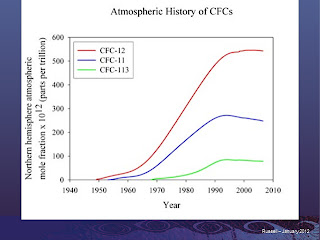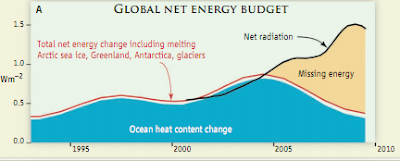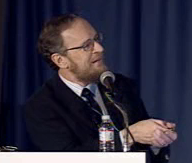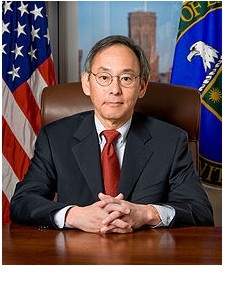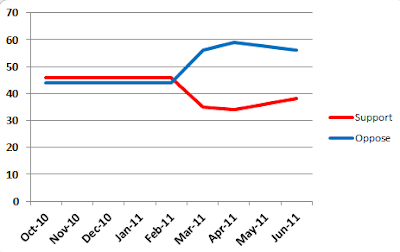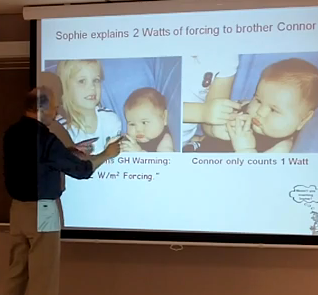Chris started the show with a clip from a shouting match held on TV between a newscaster I think it was and the weatherman from that TV show duking it out over how dangerous radiation from Fukushima was by the time it hit California, followed by a clip from a prominent right winger telling us radiation was so good for us we should put it on our cornflakes (not really). Then he introduced Dr. Brenner, and started out by sort of asking and sort of telling Dr. Brenner that he had said in the past that no amount of radiation was safe. The rest of what follows is my best effort to produce a transcript of what Dr. Brenner said on the show, with brief summaries of the questions Chris Mooney actually asked him.
Dr. Brenner: "I do believe that in fact there is no level of exposure to radiation that we can say is absolutely safe, in that the risk is zero. I think that the more likely scenario is that the lower the dose the lower the risk, the higher the dose the higher the risk. But the risk never becomes zero, so its all a question of figuring out how much radiation dose people are getting in any given situation."
Mooney: Some have worried about radiation reaching the US blah blah
Dr. Brenner: Well it certainly has. The wind happily was blowing most of the radioactive materials away from Japan and across the Pacific Ocean. And most of the radioactive materials are now in the Pacific Ocean. Some of it reached the West Coast of the USA and some of it has even reached the East Coast of the USA. But the issue is how much. And the fact that we have pretty sensitive instruments and can actually measure the radiation exposure does not mean in any sense there is a health- significant health risk. Because the dose has become so low as the radioactive material has got dispersed across the Pacific Ocean. By the time it reached the West Coast of the USA the amount of radiation was really at absolutely miniscule levels. So again, I think its not good science to say no risk, but its quite fair to say absolutely minimal risk. I think we need to bear in mind that what we're talking about here is a risk of cancer. That's the long term concern about radiation exposure. And you and I, all of us have about a 40% chance, at one point in our lives, we will get cancer. And the increased cancer risks from the radiation exposure are really not going to make any significant difference to that 40%. It will be a tiny tiny increment on that 40%.
Mooney: Well there's all these analogies flying around people compare what is happening in Japan etc
Dr. Brenner: The two situations we need to compare are the Three Mile Island situation in this country, Pennsylvania, where there was a partial meltdown of a nuclear reactor, and the situation in Chernobyl in the old Soviet Union where there was a fire and a large amount of the core of that reactor was actually emitted into the environment. So those are actually two extremes that we can think about. In the Three Mile Island situation arguably there were no health hazards associated with the pretty small releases of radiation. Now some people certainly argue the fact of whether there are any health hazards and there probably were but they were small enough that you couldn't detect them. I mean in a study, because we have this problem, the fact that 40% of us get cancer anyway, its really hard to detect a tiny increase in that 40%. So I suspect there probably was, but I don't think it was in any way detectable with epidemiological population based studies. So that's one end of the spectrum.
The other end of the spectrum is the Chernobyl situation. And its very very different in terms of scale. Chernobyl was perhaps 1,000,000 times as big as Three Mile Island. So a millions times as much releases. So there we know there were health consequences. One unfortunate thing was that the population studies that we should have done around Chernobyl haven't been done. And the reasons for that are various. The breakup of the Soviet Union into different countries, Belarus, Ukraine, having different desires, economics, how much money these things cost, so what we've ended up with are studies of only a couple of cancers. We've studied thyroid cancer, and we've studied leukemia. And both of those certainly have showed an increase in risk. But the more common cancers that should have been studied really haven't been studied. And that's a very unfortunate situation. We've lost an awful lot of information that we might otherwise get about these incidents. So there's our two extremes, Chernobyl, and Three Mile Island. So where does the current Japanese situation fit into that? Well its very much closer in terms of the amount of radioactivity released to Three Mile Island. Its clearly bigger than Three Mile Island. But its clearly nothing like a Chernobyl like situation. Its 95% towards Three Mile Island if you will.
Mooney: Let me ask you a little bit more about Chenobyl. There's a lively blogosphere debate right now about how many people died or will die from Chernobyl, and the estimates range from something like 6,000 to 1,000,000. What can we believe?
Dr. Brenner: I have to put myself down as an agnostic in this situation. I'll tell you the background to that. The first background is what we've just discussed. The actual epidemiological studies have not been done, for a variety of nonscientifically based reasons. So we have to rely on estimates of risk. So we can make estimates of people in this region getting these doses, people further away getting lower doses, people further away getting still lower doses. And you can actually do that essentially for all the population in the world. Everybody got some radiation exposure due to Chernobyl. But the further away you were the less it was. So if you start counting - and the further away you were the more people there are because ultimately you'd be counting all the people in Europe, and all the people in the world. So if you start doing risk estimates where the number of people exposed is actually the population of the world, even though the individual risks are minute, you multiply those individual minute risks by an enormous number of people, the population of Europe shall we say, and you'll end up with a significant number of cancers. Now is that a fair thing to do? Is it fair to take a tiny tiny risk and multiply it by the number of people exposed to that risk and say that's the number of cancers you expect. The answer is we don't know that. There's a lively, solid science debate I will say about that question. Is it reasonable to consider risk, a tiny tiny risk to a very very large population. If you do that you end up with a very large number of predicted cancers from Chernobyl. If you say well, people who have got an absolutely minuscule dose the risk is zero, well then you end up with a very very, much smaller estimate of the overall cancer burden from Chernobyl. So people get worked up about that argument. But it is based ultimately in a scientific question. Is it reasonable to count the risks of a very large number of people being exposed to extremely low doses of radiation? And that's a science question which has not yet really been answered. You can't answer it with population studies, for the reasons we discussed. You just can't measure population effects when they're so small in such a large population. So the only way we can really answer that question is with the basic science with trying to understand all the processes that go into radiation induced cancer and try and make sense of the question what about a very very low dose of radiation. So that's the way that question will ultimately be resolved. And I don't think it has been resolved yet. And its a really important question because the same issues are going to apply to the situation in Japan. The doses are lower but the question essentially is the same. We're going to have a large population exposed to extremely low doses. Now what does that mean in terms of the ultimate number of cancers produced?
Mooney well my understanding if I can just push this a little bit further the World Health Organization studied Chernobyl and they put a low end estimate on the number of deaths, so they were ruling out essentially these extremely low doses to extremely large numbers. Was that a valid thing to do?
Dr. Brenner: Valid is a tricky word. Is it an appropriate thing to do? That's a hard question. The best science that we have I would suggest cannot rule out the possibility that we should really include everybody that was exposed to extremely low doses. And if you do that you end up with quite large population cancer burden. That being said that doesn't mean that the individual risk to anybody was high. The distinction here is between individual risk the risk that any one person gets from a tiny dose of radiation, and a population risk. The risk to a whole population, the number of cancers that might be produced in a whole population, they're different concepts. Population risk involves individual risk and the number of people exposed. Individual risk is just individual risk. And trying to make that distinction, its an absolutely critical distinction, and its one which gets lost in the flurry of debate.
Mooney its even trickier than that because both implies we can say I'm in California its happening in Japan so I individually don't need to worry that much but at the same time it gives ammo to those who are going to say later well it killed this ungodly number of people which will scare people in the future.
Dr. Brenner: Indeed. You've hit the nail very much on the head. But it is fair that one should look at risk from both these aspects. Its important to know what people's individual risks are, but it’s also important to understand what the consequences are for a very large population would be. The analogy I sometimes give is to the lottery. So you buy a ticket for the lottery, your chances of winning are minute. But lots of people are buying tickets. So the ultimate result is that somebody will win the lottery. Its not just that your individual risk of winning the lottery is tiny. It doesn't follow that nobody will win the lottery. In fact, it is very much the opposite - somebody will win the lottery. So that's actually the argument for counting everybody. Even though the individual risks are tiny, what a tiny individual risk means is that if a very large number of people are exposed to that tiny risk, some of them will end up with the consequence we're talking about, in this case cancer. But it’s central to policy planning. If you want to think about what are the consequences of a large scale radiological release like this one that argument is completely central. As to whether nobody will get cancer from Fukushima incidents or a significant number will, and the bottom line is we don't have enough science to really come down on one side or another.
I would say its timely or untimely, to point out that the one agency in this country the US which is supporting basic science research on low dose risks facing being chopped because of the current financial negotiations going on in Washington. That's the DOE low dose program, which is specifically there to try and look at the basic science behind these risk estimates, to try and bring some hard science to this key question- whether we should be thinking about extremely low dose risks or not. Probably not a good time to be cutting that program.
Mooney: that makes sense to me. I'm glad you shifted a little bit toward policy because another thing we hear ... [is compare to coal - Mooney say more are killed by coal every year and asks Brenner if he agrees]
Dr. Brenner, well when you consider any use of radiation in society, you need to balance the risks and the benefits. Its true for a CT scan in a hospital. Its true for these new airport scanners in airports. And its also true for nuclear power. One has to think about the benefits, and think about the risks and see whether that balance makes sense. And the benefits of nuclear power of course are being able to get away from coal or oil or other things which have problems associated with them. But there are risks, that's clear, we've just seen the risks in Japan. So how do we make that risk benefit balance for nuclear power. I think the way we do that is to do our very best to understand in a numerical way, in a quantitative way what the risks really are, The debate around nuclear power typically from the extremes. From the nuclear power is deadly and is a killer to nuclear power is entirely safe. And neither of those points of view are right. We need to try and have a science based discussion and there haven't been too many of those. But if we're really going to understand where we're going to go in the nuclear power world we need to have that science based discussion about what are the real risks. Because we're certainly at a turning point a fork in the road if you will for nuclear power. One of the lessons we certainly should be learning from the Japanese situation is we need to something about our aging fleet of nuclear reactors. The Fukushima #1 reactors were 1971 vintage and we have those same reactors in this country, i.e. 1970s vintage. And they don't have the safeguards that more modern reactors do. So that's what happened when there was a total station blackout with all the power inside the plant and all the power outside the plant went out, the reactor couldn't cope with that situation and we know the consequences. More modern designs really don't have those issues, or they're very reduced in that they can continue to cool even if there's no power if any sort. They have for example gravity driven cooling. So we're clearly going to have to do something about our old reactors. We're going to have to either move away from nuclear power to a considerable extent or we're going to have to replace those reactors with modern safer reactors. And making that decision should be science based. It shouldn't be based on rhetoric.
Mooney well it seems one conclusion should be then that [we should change how the reactors are rather than count up the damage afterward]
Dr. Brenner: We need to do both. I mean yes you need to design safer reactors. But you always, I mean nobody is going to design a quote perfectly safe reactor I mean there's nothing in this world that is perfectly safe so one is always going to have to consider possibility of an accident. And again, what the consequences of that are, I think has to be built into the argument about whether nuclear power is the right way to go forward in this country.
Mooney At the end of the day where do you come out - what is your feeling on the future of nuclear power is it still part of the whole picture and has to be?
Dr. Brenner: Well I think I'm not qualified to make a comment on where nuclear power should go. I think I could say is that in order to make a reasonable decision about where we want to go in nuclear energy we need to really understand better what the nature of the risks would be if there was an accident. And we've discussed that at length today. And I don't think that we have enough science to really make those conclusions. And the fact that we don't have enough science leads to the polar opposites coming into play, the nuclear power is disastrous and nuclear power is perfectly safe. We really do need to produce more science so we have good risk estimates that everybody can buy into.
Mooney thanks Dr. Brenner. We've just heard a very nuanced take on the science of radiation risk. One that does not lend support to viewpoints on either ideological extreme. Obviously not everybody reacts to this issue with the thoughtfulness of Dr. Brenner. So how do we decide what we think about risk? Moves to next guest.






































